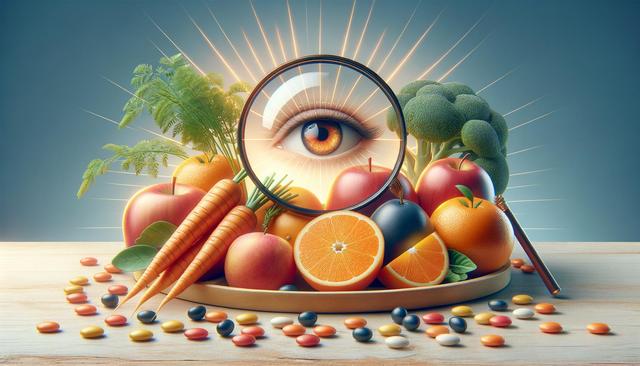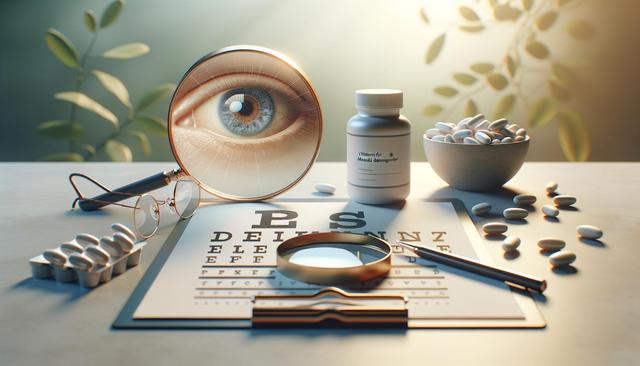The Role of Nutrition in Eye Health
Good nutrition contributes significantly to maintaining healthy eyes and preventing vision disorders. While genetics and age are uncontrollable factors, dietary habits can be adjusted to support long-term eye health. Vitamins and minerals known for their benefits to vision are often found in common foods and supplements, offering a natural way to nourish your eyes. Certain nutrients help protect the eyes from oxidative stress, reduce the risk of chronic eye diseases, and support the function of various parts of the eye like the retina and lens.
Oxidative damage caused by free radicals can lead to several eye disorders, including cataracts and age-related macular degeneration (AMD). Antioxidants, particularly certain vitamins, help neutralize these harmful molecules. That’s why a balanced diet rich in specific nutrients can be an effective preventive measure. In cases where diet alone isn’t enough, supplements may offer additional support, especially when recommended by a healthcare provider.
Vitamin A for Night Vision and Eye Surface Health
Vitamin A plays a critical role in maintaining the health of the cornea, the eye’s outermost layer. It is also essential for night vision, as it forms a part of rhodopsin, a protein in the retina that absorbs light. A deficiency in vitamin A can lead to night blindness and, in severe cases, complete vision loss. This vitamin also supports the mucous membranes, helping to keep the eyes moist and protected from infections.
Sources of vitamin A include:
- Leafy green vegetables like spinach and kale
- Orange-colored fruits and vegetables such as carrots, sweet potatoes, and pumpkins
- Animal products like liver, eggs, and dairy
For individuals with difficulties absorbing this vitamin through food, supplements can be considered, though it’s important to follow medical guidance to avoid toxicity.
Vitamin C and E for Reducing Oxidative Stress
Both vitamin C and vitamin E are powerful antioxidants that help reduce oxidative stress in the eyes. Vitamin C supports the health of blood vessels in the eyes and may reduce the risk of cataracts. Vitamin E, on the other hand, protects eye cells from damage caused by unstable molecules known as free radicals. Studies indicate that these vitamins could slow the progression of age-related eye diseases when taken as part of a broader nutritional regimen.
Good sources of these vitamins include:
- Citrus fruits, strawberries, and bell peppers for vitamin C
- Almonds, sunflower seeds, and vegetable oils for vitamin E
These nutrients are often included in multivitamin formulations targeted for eye health and are frequently part of clinical research on preventing vision loss in older adults.
Lutein and Zeaxanthin: Carotenoids for the Retina
Lutein and zeaxanthin are carotenoids that accumulate in the retina and macula, the area of the eye responsible for sharp central vision. These compounds filter harmful high-energy blue wavelengths of light and act as antioxidants, protecting eye tissues from light-induced damage. They are especially beneficial in reducing the risk of chronic eye diseases such as AMD and cataracts.
These nutrients can be found in:
- Dark green vegetables like kale, collard greens, and spinach
- Corn, peas, and egg yolks
- Supplements that specifically target eye health
Because the body doesn’t produce these carotenoids on its own, it’s important to consume them regularly through diet or supplementation. Increasing intake can improve visual performance and reduce glare sensitivity over time.
Other Important Nutrients for Vision Support
In addition to the major vitamins, several other nutrients contribute to optimal eye health. Zinc is one such mineral that plays a key role in transporting vitamin A from the liver to the retina. It also supports the functioning of retinal enzymes and is vital in the prevention of night blindness. Omega-3 fatty acids, particularly DHA and EPA, are also essential for the structural integrity of retinal cells and may help alleviate symptoms of dry eye syndrome.
Important sources include:
- Seafood like salmon, mackerel, and sardines for omega-3 fatty acids
- Legumes, nuts, and whole grains for zinc
- Fortified foods and dietary supplements containing both nutrients
These nutrients are often incorporated in comprehensive eye health supplements, making it easier to maintain adequate levels without needing multiple products. However, it’s always best to consult with a healthcare provider before starting any new supplement regimen.
Conclusion: Supporting Vision Through Smart Nutrition
For individuals concerned about vision disorders or simply looking to promote long-term eye health, incorporating essential vitamins and nutrients into daily life is a proactive step. Key vitamins like A, C, and E, along with lutein, zeaxanthin, zinc, and omega-3 fatty acids, offer targeted support for the eyes. Whether you choose to obtain these through diet or supplements, consistency and balance are key. Always consider professional guidance when making significant changes to your nutritional intake, especially if managing an existing eye condition. With the right approach to nutrition, supporting your vision can be both practical and beneficial in the long run.


